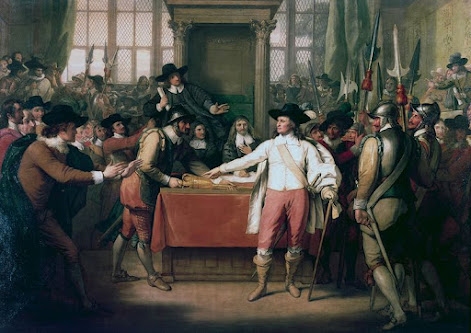 |
| Cromwell dissolving the Rump of the Long Parliament |
Government is not reason; it is not eloquent; it is force. Like fire, it is a dangerous servant and a fearful master – George Washington
In 1653, Oliver Cromwell, God’s spokesperson on earth, entered Parliament and told the legislators assembled, to quit the premises, rudely dismissing the so called Rump of the Long Parliament.
“Ye sordid prostitutes have you not defiled this sacred
place, and turned the Lord's temple into a den of thieves, by your immoral
principles and wicked practices? Ye are grown intolerably odious to the whole
nation. You were deputed here by the people to get grievances redressed, are
yourselves become the greatest grievance. Your country therefore calls upon me
to cleanse this Augean stable, by putting a final period to your iniquitous
proceedings in this House; and which by God's help, and the strength he has
given me, I am now come to do. I command ye therefore, upon the peril of your
lives, to depart immediately out of this place. Go, get you out! Make haste! Ye
venal slaves be gone! So! Take away that shining bauble there, and lock up the
doors. In the name of God, go!”
The gentlemen disassembled because they saw standing behind
Cromwell a New Model Army that had been successful in routing opposition to
British rule in both Scotland and Ireland. In both countries, Cromwell had successfully
destroyed the Catholic Church, an additional benefit. In long-suffering,
independent seeking Ireland, a famine and the bubonic plague followed close
upon Cromwell’s footsteps.
Whatever the members of Parliament did while the Lord
Protector and Ruler of the English Commonwealth was securing his
tyrannical sway over England and its expanded empire, they did not legislate.
When the monarchy and Parliament had been restored two years
after Cromwell’s death, his corpse was disinterred, put on trial by Charles II,
and posthumously convicted of high treason. Cromwell’s corpse was hanged and
beheaded, a trophy mounted on a 20 foot spike outside Westminster Hall.
Governor Ned Lamont of Connecticut, we should rejoice, is no
Cromwell. And the General Assembly that had for two years conferred on him
plenary powers similar to those of Cromwell is no Parliament.
Lamont’s extraordinary powers were conferred upon him not
because the General Assembly in Connecticut feared dispersal by force of arms.
Although everything done by Lamont during the past two years without the assent
of the General Assembly might less easily have been done with the assent of the
General Assembly, Connecticut’s legislature winked at its constitutional
obligations – for two whole years – because governance by representative
consent is somewhat more complex than governance by an executive swollen with
extra-constitutional powers.
Moreover, the conferral of extraordinary powers upon the
executive department in Connecticut has remained constant, while the
precipitating cause of the abridgment of legislative and judicial powers has
changed. The latest variant of Coronavirus, Omicron, all scientists agree, is
less potent than its predecessors. Science tells us that variants of a virus
are more contagious, less fatal and of shorter duration than the original
virus, about which little was known two years ago, when a laboratory produced
Coronavirus moved speedily from China throughout the world.
To put the matter in plain terms: Political science in
Connecticut has not kept up with the known science of anti-viral medicine.
Coronavirus 2020 is NOT Omicron-virus 2022. Because Omicron is less lethal and
more contagious, it is likely to produce natural antibodies that are, two
reliable studies show, more effective than vaccines in warding off a new
pandemic. Omicron has been called by some doctors and scientists a blessing in
disguise, a “natural vaccine,” more effective than those produced by Big Pharma
which, quite suddenly and unaccountably, has become the love child of
progressives who abhor Big Anything.
Politicians are most persuasive and credible in a federated republic
when they refuse to adorn themselves with extraordinary powers. When King
George III of England was told by American artist Benjamin West that President
George Washington was going to resign, the King said “If he does that, he will
be the greatest man in the world.”
Presently, Lamont may bask in the momentary glory of a
Cromwell. Neither he nor leaders in the General Assembly have sufficient
patriotic modesty to fully and constitutionally repeat the magnificent gesture
of Washington, who trusted that a true republican form of government would not
rob the public of its native, God given, independent force.
Comments